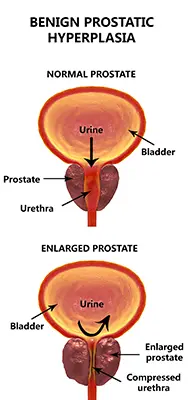Is Your Man Missing Out?
Is your partner reluctant to attend activities which require prolonged sitting, losing spontaneity with intimacy, or missing some of life’s precious moments due to urgent bathroom visits? The cause may be benign prostate hyperplasia (BPH).
 BPH is a urological condition most men experience with aging. Surrounding the urethra, the prostate gland is essential for male reproductive function. As men age, the prostate gland can grow from the size of walnut in a man’s 20s to that of a kiwi in his 60s and up. The enlarged prostate pushes up on the bladder (creating the urge to pee) and also constricts the urethra (preventing flow).
BPH is a urological condition most men experience with aging. Surrounding the urethra, the prostate gland is essential for male reproductive function. As men age, the prostate gland can grow from the size of walnut in a man’s 20s to that of a kiwi in his 60s and up. The enlarged prostate pushes up on the bladder (creating the urge to pee) and also constricts the urethra (preventing flow).
The American Urological Association has created this self-evaluation quiz for men over 40 to determine their probability of BPH.
BPH Symptom Score Index
|
|
Not at all |
Less than 1 time in 5 |
Less than half the time |
About half the time |
More than half the time |
Almost always |
Your score |
|
Incomplete emptying—It doesn’t feel like I empty my bladder all the way. |
0 |
1 |
2 |
3 |
4 |
5 |
|
|
Frequency—I have to go again less than two hours after I finish urinating. |
0 |
1 |
2 |
3 |
4 |
5 |
|
|
Intermittency—I stop and start again several times when urinating. |
0 |
1 |
2 |
3 |
4 |
5 |
|
|
Urgency—It is hard to wait when I have to urinate. |
0 |
1 |
2 |
3 |
4 |
5 |
|
|
Weak stream—I have a weak urine stream. |
0 |
1 |
2 |
3 |
4 |
5 |
|
|
Straining—I have to push or strain to begin urination. |
0 |
1 |
2 |
3 |
4 |
5 |
|
|
|
None |
1 time |
2 times |
3 times |
4 times |
5 times or more |
Your score |
|
Nocturia—I get up to urinate after I go to bed until the time I get up in the morning. |
0 |
1 |
2 |
3 |
4 |
5 |
|
|
Total AUA Symptom Score |
|
||||||
Total score: 0–7: Mildly symptomatic · 8–19: Moderately symptomatic · 20–35: Severely symptomatic.
The Canadian Continence Foundation reports over half of men in their 60s and 90% of those over 70 have urinary symptoms associated with BPH. How high should your man score before getting tested? Consider this: The Canadian Cancer Society reports one in seven men will be diagnosed with prostate cancer. Prostate cancer and BPH have many symptoms in common.
|
Potential Symptoms |
BPH |
Prostate Cancer |
|
An urgent need to urinate |
✓ |
✓ |
|
The urge to urinate many times during the day |
✓ |
✓ |
|
Waking up to urinate at night (nocturia) |
✓ |
✓ |
|
Trouble starting to urinate or having to push to release urine |
✓ |
✓ |
|
Weak or dribbling urine stream despite the feeling of urgency |
✓ |
✓ |
|
Intermittent urine flow |
✓ |
✓ |
|
Feeling of bladder not fully emptied |
✓ |
✓ |
|
Pain or burning sensation during urination |
|
✓ |
|
Presence of blood in urine |
|
✓ |
|
Erectile dysfunction |
|
✓ |
|
Painful ejaculation |
|
✓ |
|
Lower volume of semen during ejaculation |
|
✓ |
Ignoring these symptoms because “it’s normal as we age” puts men at risk of not getting an early diagnosis.[1],[2] Get your man to man up and take the test! The PSA test, a blood test to measure levels of a protein produced by prostate cells which indicate cancer, is quick and painless and will let you both know where he stands.
BPH Can Be Good News!
Getting diagnosed with BPH means we can treat the symptoms. Prescription drugs are popular approaches for treatment of BPH within medical circles. They either relax muscles within the prostate to ease urination or act as enzyme inhibitors to shrink the prostate. But according to their own product monographs, they share a common side effect, which is impotence or erectile dysfunction (ED).
Fortunately, we have natural products that have been studied and proven effective to deliver symptomatic relief for BPH without these drawbacks. Look for a formula containing the following potent ingredients:
Saw palmetto: Extracts from saw palmetto berries are among the most popular natural products for prostate health. Choose one with validated 95% fatty acid content, using CO₂ extraction. A panel of medical and pharmacy experts within the German health-care system, known as Commission E, has approved the use of saw-palmetto administration for early-stage symptoms of BPH, at 320 mg daily. This dosage is readily available in formulas and standalone supplements throughout Canada.
Rye-flower pollen extract: Studies have demonstrated supplementation with rye-flower pollen extract (known as Cernilton in Europe) benefits symptoms of BPH and chronic prostatitis.[3],[4],[5]
Free plant sterols: Well-known for cholesterol lowering benefits, they have also been proven effective for the treatment of BPH symptoms. A German BPH-Phyto Study group, using 130 mg daily, found an increase in peak urinary flow rate and a decrease in postvoid residual urinary volume.[6]
Several vitamins and minerals, including vitamins B₆ and D₃, selenium, and zinc are also recognized for prostate wellbeing.
Be wary of late-night infomercials featuring celebrity endorsers or social-media pop-up ads featuring unregulated products. Visit your local health-food store and select a product which has been thoroughly tested in an ISO 17025–accredited laboratory to ensure the identity and potency of all nutraceutical ingredients. In my practice, I have seen significant improvements in clients when they switch from a bargain brand to a premium-quality product.
Stop making pit stops at every gas station or paying a premium for aisle seats on flights. Start enjoying uninterrupted dinners, live entertainment, and bedroom escapades! Let’s ensure your guy is not missing out on the great things in life… so you don’t either!
 Dr. Ludovic Brunel, ND
Dr. Ludovic Brunel, ND
Dr. Brunel has 15+ years of experience as a naturopathic doctor and practices in Calgary. His approach has always been to improve health outcomes by relying on the best research available.
setonwellness.com
References
[1] Wagenlehner, F.M.E., H. Schneider, M. Ludwig, J. Schnitker, E. Brähler, and W. Weidner. “A pollen extract (Cernilton) in patients with inflammatory chronic prostatitis-chronic pelvic pain syndrome: A multicentre, randomised, prospective, double-blind, placebo-controlled phase 3 study.” European Urology, Vol. 56, No. 3 (2009): 544–551.
[2] Buck, A.C., R. Cox, R.W. Rees, L. Ebeling, and A. John. “Treatment of outflow tract obstruction due to benign prostatic hyperplasia with the pollen extract, cernilton. A double-blind, placebo-controlled study.” British Journal of Urology, Vol. 66, No. 4 (1990): 398–404.
[3] Buck et al, op. cit.
[4] Qian, X., X. Kong, Y. Qian, D. Xu, H. Liu, Y. Zhu, W. Guan, J. Zheng, Z. Wang, and J. Qi. “Therapeutic efficacy of Cernilton in benign prostatic hyperplasia patients with histological prostatitis after transurethral resection of the prostate.” International Journal of Clinical and Experimental Medicine, Vol. 8, No. 7 (2015): 11268–11275.
[5] Klippel, K.F., D.M. Hiltl, and B. Schipp. “A multicentric, placebo-controlled, double-blind clinical trial of beta-sitosterol (phytosterol) for the treatment of benign prostatic hyperplasia. German BPH-Phyto Study group.” British Journal of Urology, Vol. 80, No. 3 (1997): 427–432.
[6] Klippel, Hiltl, and Schipp, op. cit.

